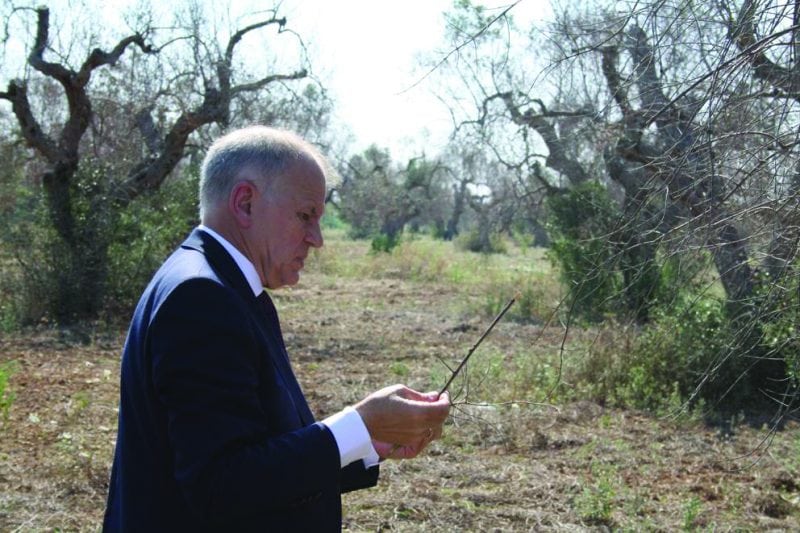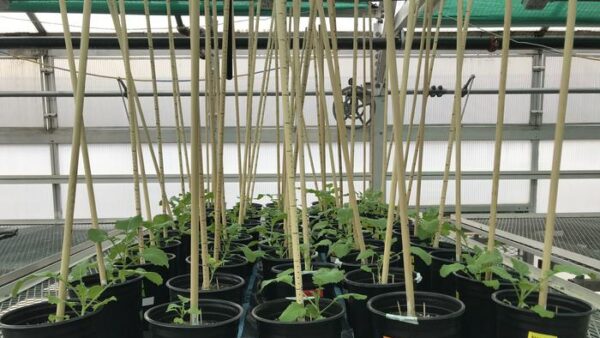EU Commissioner Vytenis Andriukaitis shares his views on battling plant diseases and the importance of plant health
A little over three years ago — in autumn 2013 — Italian national authorities reported to us the presence of a bacterium affecting olive trees in Puglia, in Southern Italy, particularly the province of Lecce. The bacterium in question, Xylella fastidiosa, was of course already known to the European scientists since it had caused massive losses to some agricultural crops in other parts of the world. However, it was the first time that the European Union (EU) had been confronted with it on its territory.
Unfortunately, today the province of Lecce is almost entirely affected, and the bacterium has also been reported — on a minor scale — in France, Germany and Spain. As European Commissioner in charge of food safety, which includes plant health, I visited the Puglia region on 19 July 2015 since I wanted to see for myself the very serious consequences of that infection. Since this outbreak was first reported, the Commission has been calling on the Italian authorities to strengthen their actions to combat Xylella.
Plant health crises are generally not widely covered by the media since it can be years until an outbreak is reported, and its consequences are less visible than health or food crises. However, Xylella is far from benign. As we have seen in Puglia — the heart of olive oil production in Italy — entire economic sectors can be seriously affected. This damages not only the agricultural economy but also has an impact on the traditional landscape of a very touristic region. We saw the same negative economic consequences at the end of the 1990’s in Portugal when a major outbreak of pine wood nematode resulted in a significant economic loss for the local timber industry.
Another important concern is that Xylella affects a wide range of plants in addition to olive trees, and at this stage there is no treatment once a plant is infected.
More generally, plant health is vital for society. Without plant production there would be neither food for humans nor feed for animals since plants form the basis of our food chain. Plants and trees are also a part of the natural environment in which we live, and the landscape we often take for granted. Outbreaks of plant diseases may therefore have devastating effects on our quality of life in addition to the economy.
For these reasons, plant health has been one of my priorities since the beginning of the mandate. I have raised this issue not only in Italy but also in numerous meetings with ministers, members of the European Parliament, farmers and industry representatives.
It is also why I wholeheartedly welcomed the entry into force, this December, of new European legislation on Plant Health (EU Regulation 2016/2031). This Regulation has been years in the making, involving lengthy negotiations with the European Parliament and EU ministers. However, all the hard work paid off, and the entry into force of this legislation, which overhauls laws that have been in place since 1977, is an important moment for the protection of agriculture, the food chain and the environment in the EU.
A cornerstone of the Regulation is the new proactive approach to the early detection and eradication of pests not allowed in EU territory (Union quarantine pests), which aims to prevent such pests from entering from non-EU countries. It is based on the ‘prevention is better than cure’ principle. In other words, it is better to spend our money, time and energy before or at the beginning of an outbreak, rather than later on when it becomes more expensive and difficult for all involved. In this respect, the Regulation sets out important new requirements, including:
- surveys of the EU territory to detect the presence of Union quarantine pests,
- timely notifications of outbreaks by professional operators,
- swift eradication activities based on a standardised approach,
- multiannual survey programmes, action plans, contingency plans and simulation exercises for priority pests, and
- stricter requirements for protected zones.
The legislation’s proactive approach also applies to plant imports to the EU, so that we prevent the potential damage from allowing or maintaining new trade with unknown phytosanitary risks. In recent years, for example, the EU has been very active on citrus black spot, making imports from countries (South Africa in particular) where the pest has been damaging orange trees, subject to strict conditions. The new Regulation introduces new requirements for confinement facilities and quarantine stations and broadens the scope of regulated commodities that need to be accompanied by a phytosanitary certificate at import.

Plant passports are the documents that accompany plants while moving within the Union and which certify their phytosanitary health status, and a key feature of the new legislation is the harmonisation of the plant passport system. The first EU plant passport with a common format should be available by the end of 2017, making it the first deliverable of this legislation. All new plant passports will have a common format, which will make them more recognisable throughout the EU.
Going forward, plant passports will be required for the movement of all plants for planting, (under the current rules, plant passports are only needed for certain ones). This is to ensure the absence of quarantine pests, as well as traceability and transparency for this category of plants.
Finally, to ensure the completeness of the new plant health system, the new legislation will, in the next three years, lead to:
- the adoption of a new comprehensive list of regulated pests, plants, plant products and other objects;
- a list of high risk plants or plant products for which, in the absence of a full risk assessment, a preliminary risk assessment will be enough to ban their import;
- a list of priority pests (Union quarantine pests with the most severe potential impacts on the economy, environment and/or society of the EU. They will be subject to enhanced measures involving surveys, action plans for their eradication, contingency plans and simulation exercises), and;
- further rules on plant passports
I should point out that the EU action goes beyond the adoption of new rules and documents. It also has a financial dimension, and the Commission is aware that additional financial resources are needed. In that respect, we have foreseen a budget to co-finance pest surveys and emergency measures to eradicate outbreaks. For surveys, a budget of EUR 15 million is foreseen for 2017, EUR 24 million for 2018, EUR 27 million for 2019 and EUR 29 million for 2020. For emergency measures, EUR 20 million will be available annually from 2017 to 2020 (the budget is to be shared with emergency measures for animal health).
The fight against plant diseases, pests and a more secure environment depends on the mobilisation of all actors. Member States will be responsible for implementing and enforcing all the measures described above, which will involve a considerable investment in terms of money and human resources. Professional operators will also need to make significant efforts. They need to have a full understanding of the new requirements. They will need the appropriate qualifications to be authorised to issue plant passports, and will need to be responsible for issues such as the timely notification of outbreaks in the areas under their control, traceability requirements and their own registration with the competent authorities.
The new Plant Health Regulation will become applicable by the end of 2019. We now have three years of work ahead of us to adopt the most important rules. My message to all involved actors is clear: we live in times when global trade intersects with climate change challenges. Plant pest outbreaks, such as Xylella, should and can be anticipated. We must mobilise ourselves to ensure that the EU is protected from the entry of non-European pests, and better prepared to deal with future outbreaks within our territory. I am convinced that our joint effort will ensure the EU’s place as a worldwide reference in the area of plant health.
Vytenis Andriukaitis is EU Commissioner for Health and Food Safety since 2014.












